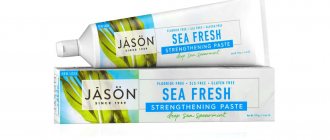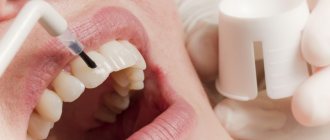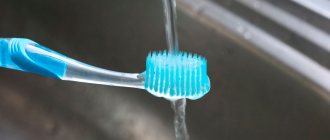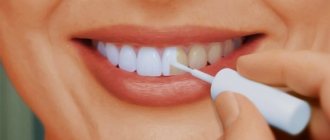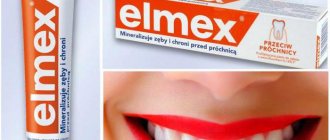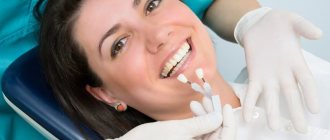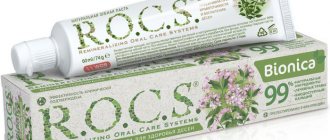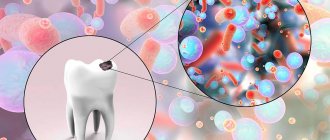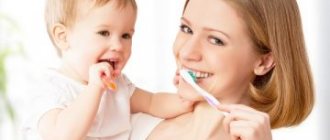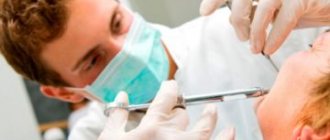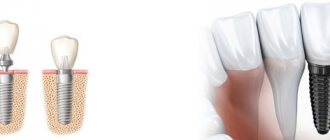From some works of classical literature it is known that in the Middle Ages, people usually lost most of their teeth by the age of 30-40. And today, in some regions of the world, representatives of the local population often cannot demonstrate a “Hollywood smile.” This is due to unbalanced, inadequate or poor nutrition. Thus, many indigenous residents of the Far North, not yet reaching old age, lose almost all their teeth (due to the predominance of heavy meat, fatty and canned foods in the diet and an acute lack of fresh fruits, vegetables, vitamins and minerals). Fortunately, modern types of prosthetics are currently available to a person with a normal average income, and most Russians in need can get new teeth to replace lost ones.
At the same time, everyone, by eating right and properly caring for the oral cavity, can preserve intact and beautiful teeth as much as possible from a young age. To achieve this, it is better to completely avoid some foods, others should be consumed in minimal quantities, and others should be given preference by including them in the daily diet.
What foods and drinks should you limit to keep your teeth healthy?
It is worth minimizing the consumption of certain types of food. These include, first of all, sweets, primarily non-natural (produced by the confectionery industry), soft ones that do not require chewing effort, as well as sticky and stringy ones. Sugar present in the oral cavity accelerates the proliferation of pathogenic bacteria. Many sweets stick to teeth, which contributes to tooth decay. Sugar-containing carbonated drinks and chewing gum are especially harmful to the oral cavity.
A large amount of red meat, fatty and fried foods contribute to the intensive proliferation of pathogenic bacteria in the oral cavity. Foods rich in acids that corrode tooth enamel should be eaten with caution. These include some citrus fruits, fruits, juices, marinades, and some canned foods.
You should consume less drinks and foods with a lot of caffeine, which removes calcium from the body. If you are used to eating a lot of chocolate, drinking strong tea or coffee (they, by the way, darken tooth enamel), then you should consume more foods high in calcium.
Natural sugar substitute
Honey is beneficial for the entire body as a whole, as it has nutritional, bactericidal, preservative, analgesic, anti-inflammatory and expectorant properties. Honey is easily absorbed by the body and can prevent many diseases. But not many people know that, despite the fact that this bee product is very sweet, it does not spoil the teeth, but rather has a positive effect on the gums, teeth and oral mucosa. The main thing is not to overdo it with your daily honey consumption.
Doctors even recommend replacing sugar with honey, since sugar not only destroys teeth, removing calcium from the body and promoting the development of caries, but also leads to the proliferation of bacteria harmful to the oral cavity. The fluoride contained in honey helps to avoid these negative consequences, strengthen teeth, prevent caries and disinfect the oral cavity. According to experts, bacteria have virtually no chance to settle on the teeth and begin to destroy them.
However, when replacing sugar with honey in tea, for example, it is worth paying attention to the fact that when heated to temperatures above 40°C, it loses its beneficial properties. It is better to pour hot tea into a cup, wait 5-7 minutes and only then add natural sweetness to it. Honey goes best with herbal tea.
What measures should be taken to maintain dental health during and after meals?
It is necessary, if possible, to avoid snacking between meals, since tooth enamel can be restored during those few hours when a person does not eat anything. In addition, you should not eat too cold or too hot food, especially dishes that contrast with each other in temperature, to prevent the formation of microcracks in the enamel. What you eat must be chewed thoroughly and intensively. Avoid foods that are too hard and require effort to chew. Juices should be drunk through a straw. Acid-containing fruits and citrus fruits are best chewed and swallowed quickly.
After meals, you can use chewing gum in which the sugar is replaced with dental-safe sweeteners (for example, xylitol). When consuming seeds, baked goods and confectionery products containing them, as well as corn in any form, you cannot do without a toothpick. After each consumption of sugar-containing and acidic foods, it is necessary to thoroughly rinse the mouth with water or a special elixir or brush your teeth.
The benefits of honey
The composition of the bee product is rich in useful components. The vast majority of them are calcium. It is this component that is responsible for the strength of bones.
The phosphorus contained is suitable for whitening, and fluoride is the main protective agent against the destruction of hard dental tissues.
This product is also not deprived of useful vitamins:
- vitamin A. It is necessary for smooth tooth enamel and also helps eliminate bleeding gums.
- vitamin D. It helps absorb calcium and phosphorus.
- vitamin C. It is necessary for bone regeneration.
What should you eat to keep your teeth as healthy as possible?
Give preference to raw vegetables and hard fruits such as carrots, cabbage, radishes, apples, and bell peppers. They train your gums and cleanse your teeth of plaque.
For dental and oral health in general, all foods that contain significant amounts of calcium, fluorine, zinc, iron, magnesium, phosphorus, vitamins A, K, D, B6, B9, B12, E and C, protein, arginine, casein and phosphates, Omega-3 polyunsaturated fatty acids, antioxidants. It is advisable to regularly consume greens (for example, dill, celery, parsley, cilantro), leafy vegetables (lettuce, spinach and others), nuts, seeds, whole grains, chicken eggs, garlic, ginger, cheese, cottage cheese, yogurt, white meat , lean beef, fish, shrimp, legumes (soybeans, lentils, beans), mushrooms, buckwheat, oats, raisins, wholemeal and bran bread.
You can moderately consume natural sweets, for example, honey (it is better to eat it with honeycombs, chewing which improves the condition of teeth and gums). You should also eat dried fruits. They are rich in vitamins, contain natural (unrefined) saccharides, and chewing them is good for your teeth. Fresh berries and fruits that are good for teeth include rose hips, strawberries, grapes, cherries, currants, peaches, plums, and pineapples. Unsweetened green tea, especially consumed after meals, is also beneficial for the oral cavity, as it contains polyphenols and fluorides, destroys many pathogens, inhibits the growth of bacteria, neutralizes acid, prevents tooth loss and reduces gum inflammation.
Plant products containing anthocyanins (for example, cranberries, blueberries, raspberries, red cabbage, eggplant, black rice) prevent the appearance and development of pathogens on teeth. Fermented milk products, due to the content of probiotics in them, prevent the proliferation of pathogens in the oral cavity.
We can conclude: maintaining dental health by eating right is not difficult. Unfortunately, many people from childhood ate the wrong things and the wrong things, which caused various dental problems. If your teeth are significantly damaged, partially or completely lost, prosthetics made using one of the advanced techniques will return you to the ability to eat without difficulty or inconvenience.
Benefits of comb honey for teeth
Honey is especially beneficial when consumed in honeycombs. Honeycomb is a natural honey package that includes a wide range of vitamins and natural antibiotics. When consuming honey along with honeycombs, wax and propolis also enter your body - the most valuable beekeeping products, which, among other things, have a beneficial effect on teeth. With regular chewing of honeycombs, the wax cleans not only the teeth, but also the tongue and gums. For gum diseases, comb honey is extremely useful, since the wax gently massages the gums, and honey has a healing effect on small wounds and cracks that cannot be seen with the naked eye, but which will nevertheless bother you. Honey also has disinfectant properties necessary for such diseases. Thanks to wax, blood circulation in the gums improves, due to which the tissues that hold the teeth become stronger, and, consequently, the teeth become stronger.
As for the propolis contained in comb honey, back in 1953 it began to be used in dental practice to anesthetize the hard tissues of teeth and soft tissues of the oral cavity. Propolis is an excellent remedy for local anesthesia. P.I. Prokopovich noted that in terms of its anesthetic properties, this product is 52 times superior to novocaine and 3.5 times superior to cocaine. Therefore, if you have a toothache, just chew honeycomb honey for a while, trying to keep it in your mouth longer, and the pain will begin to subside.
Application
Honey also helps against caries. Of course, you need to use honeycombs for these purposes: just chew them, and after a while you will notice that the tartar has disappeared somewhere. Instead, you can use a bar that contains other bee products. The abrasive properties of wax and propolis will get rid of plaque and related problems. This minimizes the risk of caries.
If desired, honey can also be used as an enamel whitening agent. For these purposes, you need to take 2 tablespoons of the product and add the same amount of iodized salt and baking soda to them. If you use the resulting mixture instead of toothpaste at least once a week, you will notice. that the smile became a couple of shades lighter.
Honey is also known as a remedy against bleeding gums. To prepare an effective product, you need to grind 10 g of propolis and melt it in a water bath. There you need to gradually pour in liquid honey until the mass becomes homogeneous. You can add sage if desired. All that remains is to strain the mixture and then apply it to the gums 2 times a week. Leave on for a couple of minutes and then rinse off with warm water.
Thus, honey will be really useful for people who have any problems with teeth or gums. But, of course, you shouldn’t forget about visits to the dentist.
STAY IN TOUCH
What else is important to know
Here are a few more important points from the document entitled “Standard Operating Procedure: Procedure for Vaccination against COVID-19 with the EpiVacCorona Vaccine in Adults”:
— On the day of vaccination, the doctor conducts a survey and examination of the patient with mandatory thermometry. At temperatures above 37 °C, vaccination is not carried out.
- Patients receiving immunosuppressive therapy (that is, drugs that suppress the immune system) and patients with immunodeficiency may not develop an adequate immune response.
— If the patient has had contact with COVID-19 patients within the last 14 days or if there are symptoms of infection during this period, a referral is issued for a PCR test for COVID-19 or for a rapid test for the presence of coronavirus SARS-CoV-2 (clause 7.3.2 of the document ).
— Those who have recovered from COVID-19 and persons who have positive test results for the presence of immunoglobulins (that is, antibodies) of classes G and M to the SARS-CoV-2 virus are not vaccinated (clause 7.3.3 of the document).
“EPIVACCORONA”: NOT EARLIER THAN A MONTH AFTER ACHIEVEMENT OF CHRONIC DISEASES
Contraindications are:
- hypersensitivity to the components of the drug (in particular, to aluminum hydroxide and others);
- severe forms of allergic diseases;
— a reaction or post-vaccination complication to a previous administration of the EpiVacCorona vaccine;
- acute infectious and non-infectious diseases, chronic diseases in the acute stage - vaccinations are carried out no earlier than a month after recovery or remission. For mild ARVI and acute infectious diseases of the gastrointestinal tract, vaccination is carried out after the temperature has normalized;
— immunodeficiency (primary);
- malignant blood diseases and neoplasms;
- pregnancy and breastfeeding;
- age up to 18 years.
The vaccine is used with caution (for what this means, see the explanations in Sputnik above) for the following diseases:
- chronic liver and kidney diseases,
- severe dysfunction of the endocrine system,
- severe diseases of the hematopoietic system,
- epilepsy, strokes and other diseases of the central nervous system,
- diseases of the cardiovascular system (history of myocardial infarction, myocarditis, endocarditis, pericarditis, coronary heart disease).
The vaccine may pose a risk and is used after a physician has assessed the risk-benefit ratio for a particular patient:
- for primary and secondary immunodeficiencies,
- for autoimmune diseases,
- in patients with allergic reactions.
